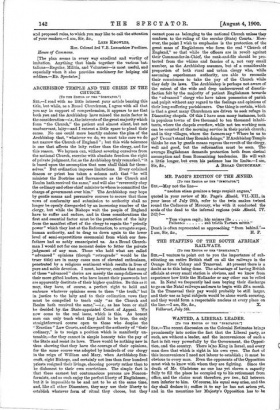ARCHBISHOP TEMPLE AND THE CRISIS IN THE CHURCH.
[TO THE EDITOR OF THE "SPECTATOR."]
read with no little interest your article bearing this title, but while, as a Broad Churchman, I agree with all that you say in support of comprehension, it appears to me that both you and the Archbishop have missed the main factor in the consideration—i.e., the interests of the great majority which form "the Church," the patient and almost silent, but not unobservant, laity—and I entreat a little space to plead their cause. No one could more heartily endorse the plea of the Archbishop that, "whatever we do, we must take care we do not narrow the Church of England "; but this wide tolerance is one that affects the laity rather than the clergy, and for this reason. We laymen can, without severing ourselves from the national Church, exercise with absolute freedom the right of private judgment, for, as the Archbishop truly remarked, "it is based upon the assumption that men shall-think for. them- selves." But ordination imposes limitations. Every ordained deacon or priest has taken a solemn oath that "he will minister the Doctrine and Sacraments as the Church and Realm bath received the same," and will also "reverently obey the ordinary and other chief minister to whom is committed the charge of government over him." The Archbishop may hope by gentle means and persuasive courses to secure that these vows of conformity and submission to authority shall no longer be openly disregarded by an increasing number of the clergy, but while the Bishops wait the people of England have to suffer and endure, and in these considerations the first and essential factor must be the protection of the laity from the manifest effort of the clergy to regain the "priestly power" which they lost at the Reformation, to arrogate super. human authority, and to drag us down again to the lower level of semi-superstitions ceremonial from which our fore- fathers had so nobly emancipated us. As a Broad Church- man I would not for one moment desire to fetter the private judgment of any man. Those who hold what are called " advanced " opinions (though "retrograde" would be the truer title) are in many cases men of elevated enthusiasm, penetrated by a religious sentiment which results in lives of pure and noble devotion. I must, however, confess that many of these " advanced " clerics are merely the camp-followers of their more gifted leaders, who have learnt their passwords but are apparently destitute of their higher qualities. Be this as it may, they have, of course, a perfect right to hold and embrace whatever opinions seem to them "the truth," but in justice to the laity and to their ordination vows they must be compelled to teach only "as the Church and Realm hath received the same,"—i.e., as has been or shall be decided. by-the -State-appointed Court of Appeal. We now come to the real issue, which is this. As honest men can only teach what they _hold to be true, the only straightforward course open to those who despise the " Erastian " Law Courts, and disregard the authority of "their ordinary," is to resign a position which is manifestly un- tenable,—for they cannot in simple honesty take the pay of the State and resist its laws. There would be nothing new in thus showing that they have the courage of their opinions, for the same course was adopted by hundreds of our clergy in the reign of William and Mary, when Archbishop San- croft. eight Bishops, and certainly not less than four hundred priests resigned their livings, choosing poverty rather than to be dishonest to their own convictions. The simple fact is that these earnest but contumacious persons are Noncon- formists, and as such enjoy the perfect liberty of Englishmen; but it is impossible to be and not to be at the same time, and, like all other Dissenters, they may use their liberty to establish whatever form of ritual they choose, but they cannot pose as belonging to the national Church unless they conform to the ruling of the secular (State) Courts. How- ever, the point I wish to emphasise is the protection of the great mass of Englishmen who form the real "Church of England," so that while the officers are in revolt against their Commander-in-Chief, the rank-and-file should be pro- tected from the whims and fancies of a, not very small number, as the Archbishop assumes, but of a considerable proportion of both rural and urban clergy who, while assuming superhuman authority, are able to reconcile their consciences to take the pay of the Church while they defy its laws. The Archbishop is perhaps not aware of the extent of the wide and deep undercurrent of dissatis- faction felt by the majority of patient Englishmen towards the " advanced " clergy who have taken possession of parish and pulpit without any regard to the feelings and opinions of their long-suffering parishioners. One thing is certain, which is that a great many Churchmen are driven to seek refuge in Dissenting chapels. Of this I have seen many instances, both in populous towns of five thousand to ten thousand inhabi- tants, where the chapels overflow, while not ten working men can be counted at the morning service in their parish church; and in tiny villages, where the farmers say "Where be us to go? Us can't stand they Romish doings," If Archbishop Temple thinks he can by gentle means repress the revolt of the clergy, well and good, but the reformation must be soon. The average Englishman demands protection both from clerical assumption and from Romanising tendencies. He will wait a little longer, but even his patience has its limits.—I am,


































 Previous page
Previous page